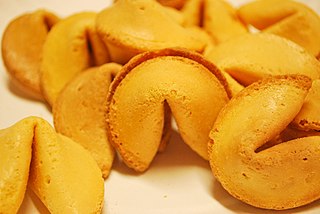
A fortune cookie is a crisp and sugary cookie wafer made from flour, sugar, vanilla, and sesame seed oil with a piece of paper inside, a "fortune", an aphorism, or a vague prophecy. The message inside may also include a Chinese phrase with translation and/or a list of lucky numbers used by some as lottery numbers. Fortune cookies are often served as a dessert in Chinese restaurants in the United States, Canada, Australia, and other countries, but they are not Chinese in origin. The exact origin of fortune cookies is unclear, though various immigrant groups in California claim to have popularized them in the early 20th century. They most likely originated from cookies made by Japanese immigrants to the United States in the late 19th or early 20th century. The Japanese version did not have the Chinese lucky numbers and were eaten with tea.
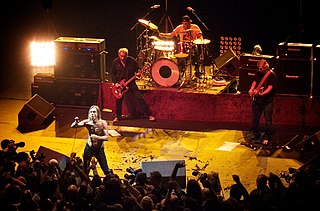
The Stooges, originally billed as the Psychedelic Stooges, and also known as Iggy and the Stooges, were an American rock band formed in Ann Arbor, Michigan, in 1967 by singer Iggy Pop, guitarist Ron Asheton, drummer Scott Asheton, and bassist Dave Alexander. Initially playing a raw, primitive style of rock and roll, the band sold few records in their original incarnation and gained a reputation for their confrontational performances, which often involved acts of self-mutilation by Iggy Pop.
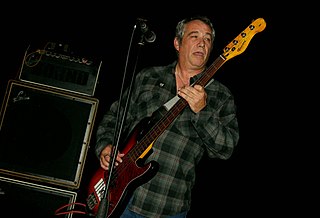
Firehose was an American alternative rock band consisting of Mike Watt, Ed Crawford, and George Hurley (drums). They were initially active from 1986 to 1994, and briefly reunited in 2012.

James Newell Osterberg Jr., known professionally as Iggy Pop, is an American singer, musician, songwriter, actor, and radio broadcaster. He was the vocalist and lyricist of proto-punk band The Stooges, who were formed in 1967 and have disbanded and reunited many times since. Often called the "Godfather of Punk", he was named one of the 50 Great Voices by NPR. In 2010, he was inducted into the Rock and Roll Hall of Fame, as a member of the Stooges. Pop also received a Grammy Lifetime Achievement Award in 2020, for his solo work.

A lottery is a form of gambling that involves the drawing of numbers at random for a prize. Some governments outlaw lotteries, while others endorse it to the extent of organizing a national or state lottery. It is common to find some degree of regulation of lottery by governments. The most common regulation is prohibition of sale to minors, and vendors must be licensed to sell lottery tickets. Although lotteries were common in the United States and some other countries during the 19th century, by the beginning of the 20th century, most forms of gambling, including lotteries and sweepstakes, were illegal in the U.S. and most of Europe as well as many other countries. This remained so until well after World War II. In the 1960s, casinos and lotteries began to re-appear throughout the world as a means for governments to raise revenue without raising taxes.
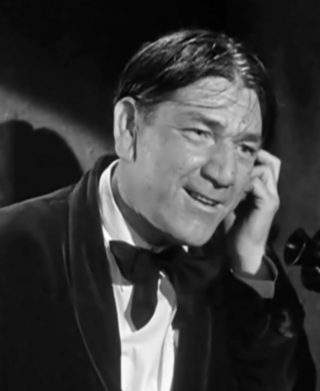
Shemp Howard, was an American comedian and actor. He was called "Shemp" because "Sam" came out that way in his mother's thick Litvak accent.

Fun House is the second studio album by American rock band the Stooges. It was released on July 7, 1970, by Elektra Records. Though initially commercially unsuccessful, Fun House developed a strong cult following. Like its predecessor and its successor, it is generally considered integral in the development of punk rock.
The numbers game, also known as the numbers racket, the Italian lottery, Mafia lottery or the daily number, is a form of illegal gambling or illegal lottery played mostly in poor and working-class neighborhoods in the United States, wherein a bettor attempts to pick three digits to match those that will be randomly drawn the following day. For many years the "number" has been the last three digits of "the handle", the amount race track bettors placed on race day at a major racetrack, published in racing journals and major newspapers in New York.
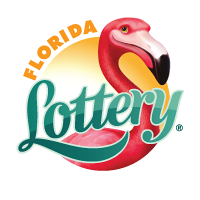
The Florida Lottery is the government-operated lottery of the U.S. state of Florida. As of 2022, the lottery offers eleven terminal-generated games: Cash4Life, Mega Millions, Powerball, Florida Lotto, Pick 2, Pick 3, Pick 4, Pick 5, Fantasy 5, Cash Pop, and Jackpot Triple Play. A player must be 18 or older to play.

Frankie and Johnny is a 1966 American Western musical film starring Elvis Presley as a riverboat gambler. The role of "Frankie" was played by Donna Douglas from The Beverly Hillbillies TV series. The film reached #40 on the Variety weekly national box office list for 1966. The budget of the film was estimated at $4.5 million. The director was Frederick De Cordova, who in 1970 went on to become the director and producer of The Tonight Show Starring Johnny Carson.
Peter H. Matthews was an operator of policy games in New York City.
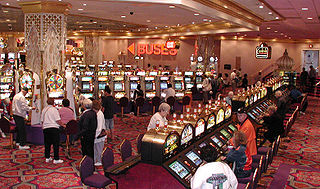
In the United States, gambling is subject to a variety of legal restrictions. In 2008, gambling activities generated gross revenues of $92.27 billion in the United States.

This is a complete list of short subjects and feature films that featured The Three Stooges released between 1930 and 1970.
The Virginia Lottery is an independent agency of the Commonwealth of Virginia. It was created in 1987 when Virginians voted in a statewide referendum in favor of a state lottery. The first ticket was sold on September 20, 1988. All profits from Virginia Lottery ticket sales go to K-12 public education, as required by Virginia's constitution. In Fiscal Year 2023, the Lottery's profits totaled more than $867.4 million, accounting for approximately 10 percent of school funding in Virginia. That brought total Lottery profits in Virginia to more than $15.5 billion.
Rosa Henderson was an American jazz and classic female blues singer and vaudeville entertainer of the Harlem Renaissance era.
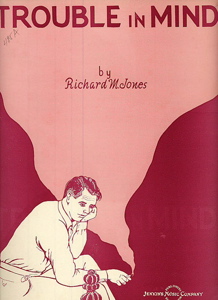
"Trouble in Mind" is a vaudeville blues-style song written by jazz pianist Richard M. Jones. Singer Thelma La Vizzo with Jones on piano first recorded it in 1924 and in 1926, Bertha "Chippie" Hill popularized the tune with her recording with Jones and trumpeter Louis Armstrong. The song became an early blues standard, with numerous renditions by a variety of musicians in a variety of styles.
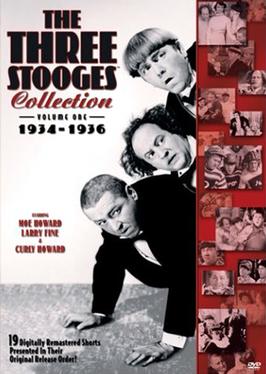
The Three Stooges Collection is a series of DVD collections of theatrical short subjects produced by Columbia Pictures starring American slapstick comedy team The Three Stooges. Each volume is a two-disc set, and covers a three-year interval, with the exception of Volume Eight, which is a three-disc set and covers the last five years at Columbia.

The Lottery is a play by Henry Fielding and was a companion piece to Joseph Addison's Cato. As a ballad opera, it contained 19 songs and was a collaboration with Mr Seedo, a musician. It first ran on 1 January 1732 at the Theatre Royal, Drury Lane. The play tells the story of a man in love with a girl. She claims she has won a lottery, however, making another man pursue her for the fortune and forcing her original suitor to pay off the other for her hand in marriage, though she does not win.

Gambling in Russia is legal in four regional subject areas, and in 2009 was made illegal in all other areas of Russia.
















